2021 Ignatian Family Teach-In for Justice Unites 2800+ Virtual and In-Person Attendees to Imagine a Path Forward
BY KELLY SWAN | November 17, 2021
“In order to move forward, we must imagine a new path…One of wholeness and healing. One of truth and peace. One of openness and liberation. A new imagination in which we fully recognize that God is in all things, in all people, in all creation. We need your imagination. And we need your conviction.”
-Teresa Cariño Petersen
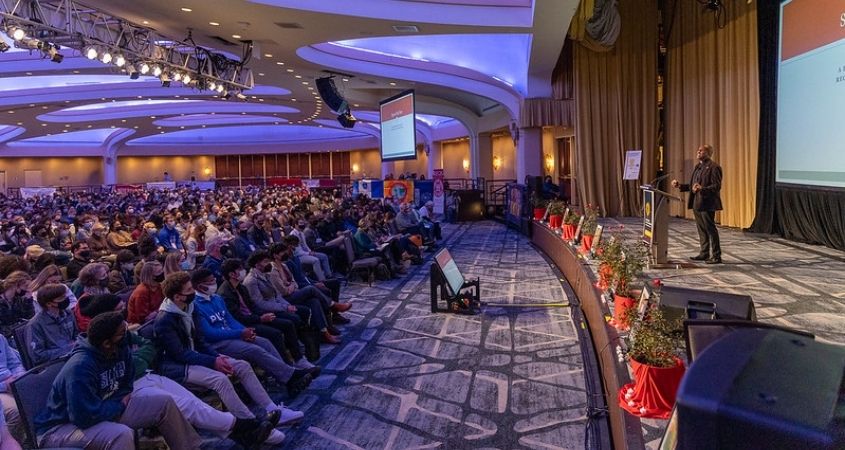
Fr. Bryan Massingale delivers a keynote address to 1,200+ attendees during the 2021 Ignatian Family Teach-In for Justice.
In October and November of 2021, more than 2,800 individuals committed to the common good gathered virtually and in-person for the 24th annual Ignatian Family Teach-In for Justice (IFTJ).
The 2021 theme—Imagining a Path Forward: Reflection. Reckoning. Kinship.—invited attendees to consider the ways in which the pandemic has exacerbated and laid bare injustices in the world, and to take action in ways that center the needs of the most vulnerable and builds a deeper sense of kinship and community.
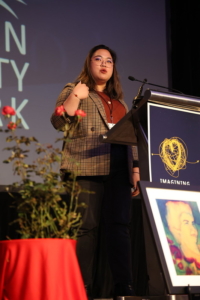
Teresa Cariño Petersen breaks open the theme at the 2021 Ignatian Family Teach-In for Justice
On October 16, nearly 1,600 registrants gathered virtually to explore this theme. Sr. Norma Pimentel, executive director of Catholic Charities of the Rio Grande Valley, served as keynote speaker. She spoke about the reality of those seeking asylum on the U.S.-Mexico border and encouraged attendees to be change agents, saying “Our world urgently needs us to believe, to imagine, to act. It is now that we must say yes—we collectively own what we can do together.”
Fr. James Martin, S.J., closed the virtual conference with an Ignatian Examen, reminding justice seeking attendees that “every moment is an opportunity to encounter God.”
.From November 6-8 in Washington, D.C., more than 1,200 individuals gathered for the in-person IFTJ.
The weekend featured three keynote speakers—Fr. Bryan Massingale, racial justice scholar and professor of theology at Fordham University; Keya Chatterjee, executive director of the U.S. Climate Action Network; and Fr. Gregory Boyle, S.J., founder of Homeboy Industries.
On Saturday evening, Fr. Massingale spoke of racism as a life issue. “We are called to be witnesses of racial justice because we are Catholic, we are Christian, we are followers of Jesus, we are children of God, and we believe in the dignity of life,” he told attendees.
He spoke to the theme of reflection and reckoning, emphasizing that “We want to do something immediately, but we need to sit with the discomfort. Until we mourn and grieve, we cannot do the difficult work to change,” and describing the work of racial justice in terms of kinship as a relay race, passing the baton as each person does their part.
Keya Chatterjee spoke on Sunday morning, drawing lines between the realities of climate change and other justice issues, including racial justice and the pandemic. “There’s a mismatch between our politics and this crisis that we face. We’ve seen this with COVID too. We’re in a moment where we have to realize that it will take all of us together to move forward,” she said.
She went on to emphasize the moral imperative for faith communities to step up as part of the solution to climate issues, particularly citing Pope Francis’ call to care for our common home in his encyclical on the environment, Laudato Si’, and the witness of the the five individuals, including the Jesuit-educated Paul Campion, who participated in a hunger strike outside of the White House in October. “If our faith communities within the last decade had been taking forward a message of protecting each other and our planet, we wouldn’t need to have hunger strikers right now. Are our schools teaching Laudato Si’?,” she asked.
The founder of Homeboy Industries, Fr. Greg Boyle, S.J., served as the weekend’s final keynote speaker. He spoke of the call to work for justice, reminding attendees that “it is about taking seriously what Jesus took seriously: inclusion, nonviolence, and compassionate acceptance.”
He powerfully invoked the final word of the 2021 IFTJ theme, stating that “We are about kinship, about connection. There is an end goal for our margins. We want to expand the circle until it includes everyone.”
Sunday included Catholic mass, with presider Rev. Tim Kesicki, S.J., the former president of the Jesuit Conference of Canada and the United States, who is now working with the Descendants Truth and Reconciliation Foundation, a new partnership between descendants of Jesuit slaveholding and the Jesuits in the U.S.
Speakers throughout the weekend were complemented by art as activism, theological reflection, and social analysis. Francisco Herrera, a musician and longtime IFTJ artist-in-residence, provided music on the mainstage. Kate Marshall, facilitator of the House of Hagar Catholic Worker in Wheeling, West Virginia, presented Deconstruction not Destruction, an interactive art installation exploring the IFTJ through the life of the monarch butterfly at the intersection of migration and environmental justice.
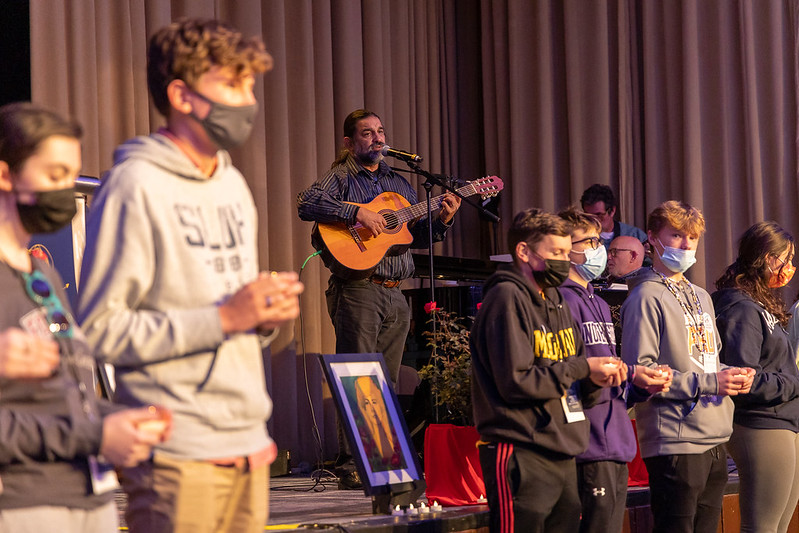
Francisco Herrera, IFTJ artist-in-residence (center, with guitar), provides music during the annual IFTJ Prayer for the Jesuit Martyrs.
On Sunday evening, more than 400 IFTJ attendees gathered outside of the White House in Lafayette Square for a candlelight vigil to put their Teach-In experience into action to pray for an end to Title 42—the policy being unjustly used to turn away asylum seekers at the U.S. border during the pandemic. The weekend then culminated with a public witness in Union Square near the U.S. Capitol, leading to a virtual advocacy day on November 16, focused on humane and just immigration and environmental policy.
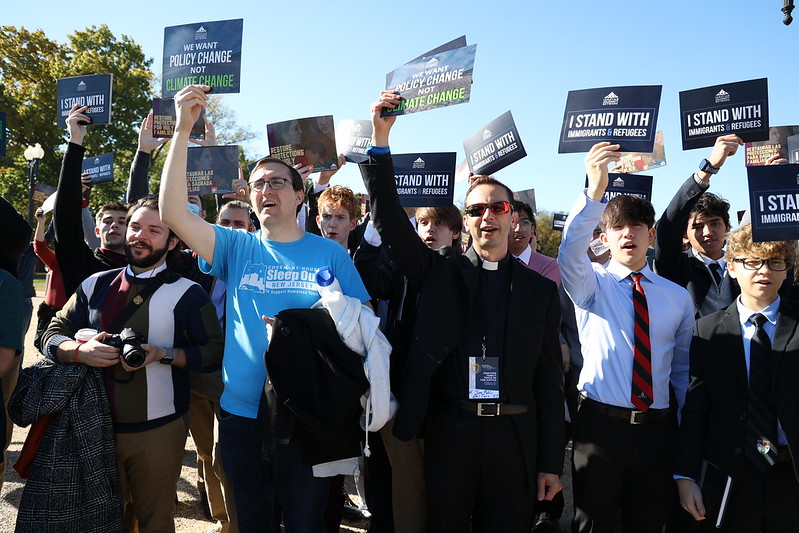
Delegates participate in the 2021 IFTJ Public Witness outside the U.S. Capitol.
Initiated in 1997, the Ignatian Family Teach-In for Justice honors the witness of the Jesuit martyrs and their companions in El Salvador, marking the 32nd anniversary of their deaths on November 16, 1989. They were killed for their commitment to the marginalized of El Salvador and speaking out against the injustices perpetrated by the government and military.
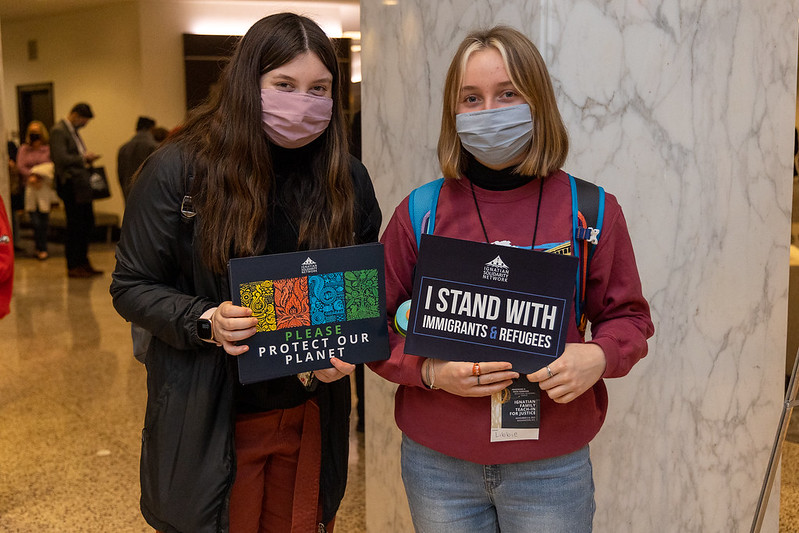
IFTJ 2021 delegates.
The Ignatian Family Teach-In for Justice is generously sponsored by the Association of Jesuit Colleges and Universities, Augsburg University Center for Global Education and Experience, Boston College School of Theology and Ministry, Bread for the World, Catholic Climate Covenant, Catholic Theological Union, Catholic Women Preach, Equal Exchange, Ethix Merch, Franciscan School of Theology, the Jesuit Conference Office of Justice and Ecology, Jesuit Refugee Service/USA, Jesuit Schools Network, Jesuit Volunteer Corps, Kalmanovitz Initiative for Labor and the Working Poor, Maggie’s Place, Magis Americas, National Catholic Reporter, Sojourners, St. Joseph Worker Program, U.S. Catholic Sisters Against Human Trafficking, the University of San Francisco McGrath Institute for Jesuit Catholic Education, Villanova University Campus Ministry, and Xavier University.
Did you know that videos of all mainstage speakers and events are available to view for free on YouTube? Check out the IFTJ 2021 Playlist here!
Plus, check out the IFTJ 2021 hightlight video here:
Kelly Swan has worked for the Ignatian Solidarity Network since 2016, first as communications director, and now as director of advancement. She grew up in West Virginia and is a graduate of Wheeling Jesuit University. Kelly has worked in parish social ministry, child and family advocacy, community education and organizing, and publishing. She lives in the Cleveland, Ohio area with her children.

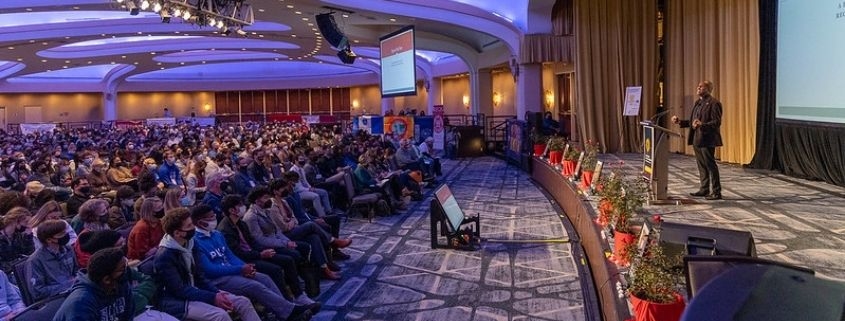
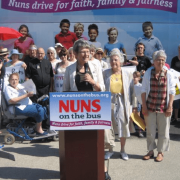
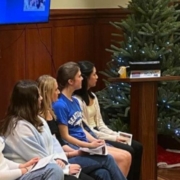
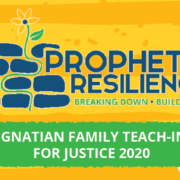
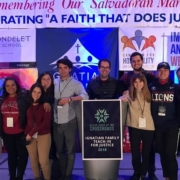
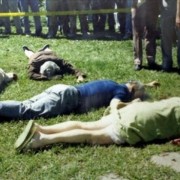
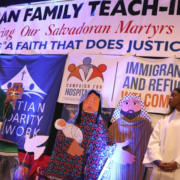

nice.
soulomelodymall – https://www.soulomelodymall.com
Want to know more about this stuff?
thank you for this
Chua thinks this is a good thing.
Chua thinks this is a good thing.
Respecting one another and respecting our Planet can add life to our lifespan and to the lifespan of our Planet.
Path to move forward indeed <3